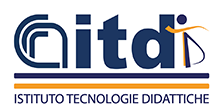Research Project "Educating New Generations to Inhabit Futures"
Research Background
Digital innovation today is accelerating exponentially: Artificial Intelligence (AI) and Robotics are increasingly shaping our daily lives. This imposes a deeper understanding of the nature of digital innovation in the AI era as a dynamic, continuously evolving, and future-oriented process, yet with present implications.
Hence, there is a need to promote a critical culture of digital innovation among new generations who will have to inhabit acceleration, uncertainty and complexity.
In the educational context, discussions about digital innovation culture mainly refer to (i) organisational aspects aimed at building a shared vision within the educational institution or (ii) to pedagogical aspects, focusing on how digital technologies can innovate teaching, learning and assessment practices.
Less frequently, initiatives and activities are promoted that directly involve students in a process that stimulates critical reflection from a prospective view of digital innovation.
Recent developments in Futures Studies explore the hypothesis that ontologically distinct types of imagined futures (“imagined” in different contexts, for different reasons, with different methods), foster the development of a critical and creative thinking mindset, playing a central role in what humans can perceive.
The research project aims to investigate how new pedagogical approaches based on Futures Studies contribute to seed a critical culture of digital innovation among secondary school students.
Research Objectives
The main objectives of the research project encompass three dimensions: conceptual, methodological and technological (EduTech). Specifically:
- The conceptual dimension will outline the theoretical framework, looking at the intersection of Futures Studies (Poli, 2018; Baerten, 2021); critical pedagogy (Freire, 1970); AI in education (Gentile et al., 2023); and sustainable digital innovation (Pascale et al., 2023).
- The methodological dimension will explore methods and approaches typical of Futures Studies to define pedagogical practices that allow students to exercise critical reflection from a prospective view on possible futures with AI and Robotics and stimulate understanding of the present.
- The EduTech dimension will explore the use of immersive spaces and conversational agents to support students in experiencing future-oriented working methods.
Planned Activities
The research will be structured according to the following activity lines:
- State-of-the-art Study, which includes:
- A targeted literature review on the intersection of Futures Studies, critical pedagogy, AI in education, and sustainable digital innovation.
- Interviews with experts in Futures Studies, teachers, and policymakers.
- Intervention Model, which consists of:
- Development of an educational approach based on anticipatory thinking and speculative design.
- Creation of conditions for classroom experimentation.
- Design of a training course for teachers.
- Experimentation, which involves students from various types of secondary schools (high schools, technical institutes, vocational schools, etc.).
Expected Results
- Analysis and definition of the key components and characteristics of a critical culture of digital innovation in the AI era.
- Identifying future studies methods serving to seed a critical culture of digital innovation.
- Defining a methodological approach and toolkit based on the principles of critical and intersectional pedagogy.
- Designing and developing a laboratory path (in an immersive environment) where students can practice speculative/anticipatory skills in the AI era.
- Training course for teachers on the proposed methodological approach.
Reference Publications
- Presentation of the research project at the annual CNR – ITD event (Ostuni, May 24, 2024).
- Bocconi, S., Staggini, G., Piras, V., and Talamini, F. (2024). Fostering students’ ability to envision possible futures with AI & Robotics: a teacher training course on Anticipatory Thinking for secondary schools. In Proceedings of EdMedia2024, Brussels, July 2-5, 2024.
- Bocconi, S., Talamini, F., Trentin, G. (2023). Spreading digital innovation culture among students. A multi-stage laboratory model on AI and anticipatory thinking for schools. Proceedings of EDULEARN 2023, the 15th International Conference on Education and New Learning Technologies, Palma de Mallorca, Spain, July 3-5, 2023. IATED Digital Library, ISBN: 978-84-09-52151-7, doi: doi.org/10.21125/edulearn.2023.
Research Project Presentation
{phocadownload view=file|id=22|target=s}
 Italiano (Italia)
Italiano (Italia)  English (United Kingdom)
English (United Kingdom) 

